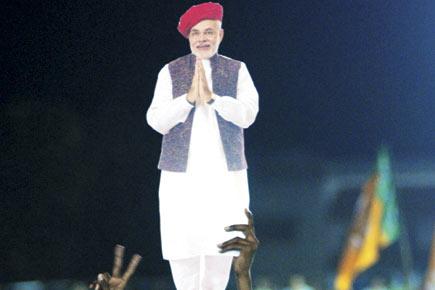The Bharatiya Janata Party’s (BJP) thumping victory in the Lok Sabha elections with the National Democratic Alliance (NDA) winning 336 of 543 seats has sent expectations soaring

 The Bharatiya Janata Party’s (BJP) thumping victory in the Lok Sabha elections with the National Democratic Alliance (NDA) winning 336 of 543 seats has sent expectations soaring.
The Bharatiya Janata Party’s (BJP) thumping victory in the Lok Sabha elections with the National Democratic Alliance (NDA) winning 336 of 543 seats has sent expectations soaring.
Partly, these expectations are based on Modi’s promises of increasing economic growth and reducing corruption, based on his success in Gujarat, where he has been chief minister.
ADVERTISEMENT
Partly, these are expectations of a man who leads a solitary life, not driven by dynastic family ambitions or of the outsider hungry to make a mark on the national scene. The national mood is upbeat, and markets are already soaring.

A few words of caution. A healthy democracy needs an effective opposition, as much as a functioning government. The opposition is in tatters, and the Congress, lacking even one-tenth of the seats, cannot be leader of the opposition. In fact, Modi’s real challenge may not be outside, but within.
There are grave concerns about a powerful right-wing government, especially as Modi is a Hindu nationalist and authoritarian, with a cult following. The Rashtriya Swayamsevak Sangh (RSS), the political offshoot of the BJP, driven by Hindu supremacy, pathological distrust of Muslims and a swadeshi ideology, has groomed Modi.
Modi participated in Advani’s rath yatra, that culminated in the demolition of the Babri Masjid in 1992. Although he has been cleared by judicial enquiries of complicity in crimes, including the Gujarat pogrom in 2002 in which over a 1000, mostly Muslims, were murdered, suspicions of deep-rooted prejudice remain.
Moreover, the RSS has played a crucial role in the formation of the Modi government, as key BJP leaders including Amit Shah, Arun Jaitley, Rajiv Pratap Rudy and Vinay Katiyar met RSS leaders in Delhi this week. India, with about 176 million Muslims making up 14 per cent of the population, is estimated to have the world’s second-largest Muslim population. Not insignificant numbers, and many Muslims have voted for Modi.
Ironically, on May 16, the day Modi won his historic mandate, the Supreme Court set free Adam Mansuri, Mohammed Saleem and four others in the Akshardham temple case of 2002, pulling up the Gujarat Police for framing innocent people, and blaming the then home minister Modi for “non application of mind.” Four of them have spent over 10 years in jail, and Mansuri and Saleem had been sentenced to death.
This is a courageous, relatively rare judgement. In fact, the disturbing institutional saffronisation of the police, judiciary, government as well as the media, can only have disastrous consequences in a secular state. Modi is aware the Gujarat riots will remain a blot on his record, and he is being keenly watched to see whether he includes Muslims in the economic development that he has promised all Indians.
A Hindu nationalist government will only create further mistrust, violence and paranoia about neighbours — all of which would take away from economic gains and negatively influence India’s international relations. The challenge for Modi will be whether he can distance himself from RSS ideology and be truly secular.
His remark, “I will encourage Muslims to hold the Quran in one hand and a laptop in the other,” may be well intended. But for long-term stability, Muslims need equal opportunities in education, health and livelihoods to ensure equal participation in India’s growth story.
Gujarat has made tremendous economic progress, but Reserve Bank governor Raghuram Rajan’s committee revealed that the state is lagging at 12th of India’s 28 states in development indices. So too, many Muslim-dominant areas in India lack basic facilities, and an Institute of Objective Studies survey shows that even in Delhi, there is discrimination against Muslim majority areas in provision of basic civic amenities by the government. In his victory speech, Modi promised to work for the good of all Indians and we can only hope he will act on it.
Meenakshi Shedde is India Consultant to the Berlin Film Festival, an award-winning critic, curator to festivals worldwide, and journalist. She can be reached at meenakshishedde@gmail.com. The views expressed in this column are the individual’s and don’t represent those of the paper.
 Subscribe today by clicking the link and stay updated with the latest news!" Click here!
Subscribe today by clicking the link and stay updated with the latest news!" Click here!







